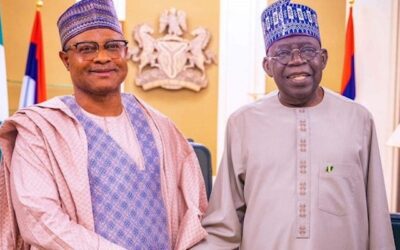FG Mulls Tax Largesse To Boost Mining Sector

Federal Government of Nigeria has come face-to-face with reality that the nation’s oil-driven economy should be diversified. What are the plans on the ground to actualise this?
***
The Minister of Mines and Steel Development, Olamilekan Adegbite, has said the reforms by the current administration have begun to bear fruits following achievements in de-risking the sector, thus making it investor-friendly.
Adegbite highlighted that the Ministry had operationalised an Artisanal and Small Scale Mining (ASM) Remote Sensing Monitoring System to regulate and support ASM activities.
He disclosed that the ministry had almost completed the automation of the Mining Cadastre System to meet international full standards for online mining title and licence applications and approvals and decentralise the Mining Cadastre Office (MCO) administrative system. Also, he said the ministry would establish a Nigerian Geo Data Centre at the Nigerian Geological Survey Agency (NGSA) to ease online access to correct geological reports and data for investment decisions and research; and establishment of the Investment Promotion and Mineral Trade Department for investment partners.
According to him, “there are incentives put in place for players in the sector and potential investors: Customs and import duties waiver for plant, machinery and equipment imported for mining operations; Tax holidays of between three to five years as applicable; free transferability of funds and permission to retain and use earned foreign exchange; capital allowances of up to 95 per cent of qualifying capital expenditure; deductibility of environmental costs (money meant for environmental remediation will be tax free); and100 per cent ownership of mineral properties.
“Presently, our priority is anchored on the gold sector. We are creating a gold ecosystem to minimise the high rate of illegal gold mining and smuggling, increase government’s revenue from the resource, create jobs, and improve environmental and social stewardship.
“Through the ongoing Presidential Artisanal Gold Mining Initiative (PAGMI), we are organising, formalising, and equipping Artisanal and Small Gold Miners (ASGMs) in Kaduna, Kebbi, Osun, Niger, Ebonyi, Sokoto, Gombe, and Ekiti states.
“Miners of gold and other metals will be linked to formal markets through licensed precious metals buying centres. One of such initiatives is the recently launched Dukia-Heritage Bank Buying Centre.
“Two gold refineries, Kian Smith and Dukia Gold and Precious Metals Refining Company Limited, are currently being built to increase the value of gold in the country for the benefit of all stakeholders.
“We are fast-tracking mineral processing in the country using a cluster approach. Each cluster will be equipped with modern equipment and technologies to support a network of miners, processors, skills development providers, logistics providers, among others.”
He noted that other ongoing initiatives to stimulate the growth of the industry include working with several stakeholders to design mining specific credit enhancement instruments.
“Miners will be able to access long-term finance at concessionary rates through these instruments; generating integrated geoscience information that will help in de-risking the mining sector, developing a mineral economic corridor strategy to address inadequate infrastructure for the mining value chain to function,” Adegbite said.
The Minister of State, Mines and Steel Development, Dr Uchechukwu Ogah, speaking at the sixth edition of the Annual Kaduna Economic and Investment Summit (KADINVEST), also wooed investors in the solid minerals and metals sectors , saying the sector is the future economy of the country.
Ogah urged all prospective investors to liaise with the relevant agencies of ministry of mines and steel development for necessary information to make their investment decisions.
Read Also: Diaspora Remittances: Taking Full Advantage of the Cash Flow
According to the minister, in the past major infrastructure in the country like Tincan Seaport in Lagos, Port-Harcourt Seaport in Rivers, Eastern Railway line, Western Railway line and the Standard guage Central Rail line, Power plants, among others; were developed to service the mineral sector.
He noted that they were working on the ailing assets with the Bureau of Public Enterprises (BPE) to bring them to production.
The minister pointed out that Kaduna State is strategically located in the mineral map of Nigeria, with virtually all the major different types of Nigerian mineral endowment of the future like Nickel, Cobalt, Tungsten, Vanadium, among others, bordering other mineral-rich states like Niger, Nasarawa, the Federal Capital Territory (FCT), Plateau, etc.
He said the Federal Government through NGSA had generated preliminary geoscience data that could guide proper identification of “hot spot” areas for detailed exploration across Kaduna State, which he said would definitely attract serious mining investments to the state.
Ogah urged the state governments to support MIREMCO programmes, as it would enhance revenue generation from mining operations.
The failure of Nigeria, since independence in 1960, to put in place a structure that will make the benefits of the exploitation of solid minerals available to all Nigerians, has been the bane of the nation, while the Exclusive List of the 1999 Constitution (as amended) vests the power of control and management of solid minerals resources with the Federal Government.
It is in line with the constitutional provisions that the Nigerian Minerals and Mining Act, 2007 was enacted to provide the legal framework for the administration of the sector.
However, the idea of a faraway Federal Government determining how to administer the natural endowment within the states, local government councils and local communities, have not been properly treasured by the other tiers of government, and this has created an unfriendly atmosphere in many mining jurisdictions.
Consequently, such cases have made genuine investors to lose their investment and thereby scaring away prospective investors.
Aside from these, revenue due to the Federal Government and indirectly the states/local government areas have been lost, due to illegal operations by unlicensed actors who enjoy the backing of such local authorities.
He recalled that there has been extortion, imposition of Community Development Agreement (CDA), and Memorandum of Understanding (MOU) on miners; registration and issuance of permits to sand operators and miners by the state Ministry of Environment.
Though a number of the state governments engage in the foregoing activities to improve their revenue, the actions constitute a major disincentive to prospective investors in the sector and invariably jeopardise the effort of the government at diversifying the economy.
He disclosed that the revenue generated by the Federal Government is distributed among the tiers of government in addition to the implementation of the 13 per cent derivation policy for the solid mineral producing states, which he said had commenced.
The minister therefore noted the need for a synergy between the federal and state governments to ensure an increase in revenue generation, greater contribution of the mineral and mining sector to the Gross Domestic Product (GDP) and improvement in the country’s ranking on ease of doing business in the sector.
Read Also: Data, Not Oil, Should be the Mainstay of Nigeria’s Economy – Maigari
The Vice President, Professor Yemi Osinbajo, said the ESP had created and saved over two million jobs through its implementation which he said began in June last year.
Speaking on the ‘Critical Role of Local Governments for the Realisation of Economic Diversification Agenda Through the Mineral Sector’, Osinbajo said the Federal Government disclosed a target of five per cent for solid minerals sector contribution to GDP by 2025 from the current 0.6 per cent.
The Minister of State for Mining and Steel Development in a statement signed by the Director, Press and Public Relations Department, Etore Thomas, also said: “The management of the ministry met with the baryte miners over the huge importation of processed baryte into the country by the oil/gas companies, and developed a baryte programme to substitute imported products. The programme would be launched before the end of 2021 and oil/gas companies would be using Nigerian baryte processed products for their exploration works.
He said efforts were ongoing to stamp out illegal mining and formalising artisanal and small-scale mining activities across the country; as well as collaboration with the private sector to create a large number of well-paying jobs for Nigerian youths.
According to the Minister, “Arising from the above vision of President Muhammadu Buhari, the Ministry of Mines and Steel Development has initiated the following programmes/interventions: Federal Government Direct Intervention Fund under the National Integrated Mineral Exploration Project (NIMEP) was designed to take advantage of the under-explored metallogenic belts.
“This is aimed at generating geoscience data capable of spurring investments into the sector. The project is looking at commodities such as gold, lead, zinc, tantalite, lithium, iron ore, nickel, etc.
“The downstream policy of the ministry is an effort to ensure that mineral ores are not exported out of Nigeria without value addition.
“We are currently developing Artisanal and Small-Scale Mining Clusters in six geo-political zones (Kano for North-West, Bauchi for North-East, Kogi for North-Central, Ebonyi for South-East, Cross River for South-South and Oyo for South-West) of the country to harness ASM mine produce and processed them at the cluster centres.
“We have upgraded and automated our mineral title administration system to enable online application in processing of mineral titles, and we have established six zonal offices in each geo-political zone of the country.”
There is therefore the need to checkmate the collaboration between politically connected Nigerians and Chinese corporations in illegal gold mining which influences rural banditry and violent local conflicts in some parts of the North-West, North-Central and even to some extent South-West regions of Nigeria.
Additionally, those who sponsor illegal mining and also funded banditry and rustling in mining communities in order to incite violence among cattle breeders should be brought to book as such conflicts displace people and create opportunities for illegal miners to operate.
Segilola gold project in Osun State is expected to be a game changer in the industry as the facility will mine and produce gold ore.
More recently, the Nigerian government licensed gold refineries to produce the metal for export, and for the Central Bank of Nigeria (CBN) to become an off-taker, buying at international prices.
The Presidential Artisanal Gold Mining Initiative was also recently flagged off by the Federal Government, working with the Solid Mineral Development Fund.
Iron ore found in Kogi, Enugu, Niger, Zamfara, and Kaduna states is one of the critical minerals for the production of steel. Earlier in May, the Federal Government inaugurated the Ajaokuta Presidential Project Implementation Team.
The implementation team was commissioned to prepare and submit periodic work plans and to develop concession contract terms towards reviving Ajaokuta Steel Company Limited.
The current administration has made active attempts to diversify the Nigerian economy from crude oil by prioritising the mining and agricultural sector, and by creating incentives for investment and unlocking its potential.
Ajaokuta remains the key to Nigeria’s industrialisation and President Buhari and his team should see the resuscitation of Ajaokuta as a matter of patriotism.
No doubt, the abundance of mineral resources in Nigeria can change the narratives of the majority of Nigerians who are still wallowing in poverty.


